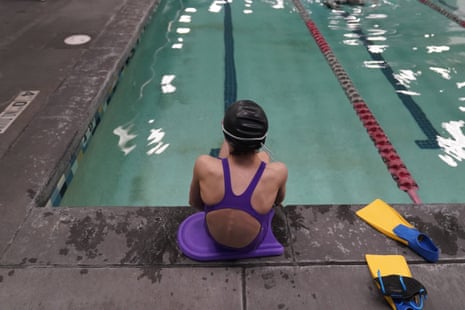Republican lawmakers in more than 25 US states have advanced legislation banning transgender children from certain sports teams and limiting their access to gender-affirming healthcare.
Trans youth represent just a fraction of the US population – recent estimates suggest they make up 0.7% to 2% of youth. But conservative lawmakers have introduced more than 80 bills regulating their lives in the first three months of 2021, the highest-ever number of anti-trans legislative proposals filed in a single year.
The volume of bills, which have spread in nearly every region of the country, and the coordinated campaigns behind some of them, suggests trans kids’ lives have become a central focus of the GOP culture war following the 2020 presidential election.
“They are acting like we aren’t humans, that we don’t deserve the same things as them,” said Kris Wilka, a 13-year-old football player and trans boy in South Dakota, where lawmakers have passed legislation that would prohibit trans students from playing on the sports teams that correspond with their gender.
“Trans rights have been turned into a wedge issue,” said Jules Gill-Peterson, professor of gender, sexuality and women’s studies at the University of Pittsburgh, who has researched the history of trans children in the US.
“The Republican party is hardly interested in defending women’s sports. This is a purely calculated political play,” Gill-Peterson said. “And it’s really easy to use children as a political football, because we don’t grant children the privilege to speak for themselves and defend their own interests.”
‘This is not a real issue’
The bills have largely focused on two issues: sports and healthcare. The sports bills seek to ban trans kids from competing on teams that correspond with their gender. The healthcare bills block their access to gender-affirming medical treatments, and in some cases criminalize doctors and parents who support them.
The youth sports bills, which claim to “promote fairness in women’s sports”, are based on a simple claim: that boys will be allowed to compete against girls and have an unfair advantage.
“They’re telling parents of cisgender children that you’re losing something by allowing transgender youth to play in sports,” said Alphonso David, president of the Human Rights Campaign (HRC), an LGBTQ+ rights group. “We’ve seen this playbook before – you’re losing something if you allow same-sex couples to marry, if you protect racial minorities in the workplace, if immigration laws are respected. It’s us v them.”
But there is no research suggesting that trans girls have a competitive advantage. When the Associated Press recently contacted lawmakers behind the proposed bans, most couldn’t cite a single local example of a trans girl playing sports. Some pointed to a Connecticut case in which cisgender girls’ families sued, alleging that two trans female sprinters had an unfair advantage.
But two days after that lawsuit was filed, one of the cis girls beat her trans competitor in a state championship race, noted Dr Jack Turban, a child psychiatry fellow at Stanford who researches trans youth mental health: “This is not a real issue impacting America’s youth.” In California, schools for years have been required to allow trans students to participate on the teams that match their gender, and there have been no concerns, he said.
Some GOP lawmakers were supporting the bans because they knew it would galvanize voters afraid of change and unfamiliar with trans people, said the Arkansas state senator Joyce Elliott, a Democrat who has spoken against the proposed ban in her state.
Elliott, who is Black, noted that youth sports had long been a battleground for civil rights: she was barred from playing on the school basketball team with white students when she was 15 in 1966. A coach, she said, told her: “‘We don’t have a uniform that will fit you.’”
“I just had flashbacks of standing in that gym and the coach saying those words to me that I knew were based on my race and nothing else, and how deeply that hurt,” she recalled. “All I wanted to do was play.”

Jeanette Jennings, the mother of the trans reality star Jazz Jennings, who was banned from girls’ soccer when she was eight years old, believes the legislative focus on trans children is a response to increased visibility. “Trans kids have always been there, but in the past they were afraid to come out, so they waited until they were adults. But more and more, kids are not afraid to express who they are, and parents and family are supporting them, which is what we’ve been fighting for all along.”
From bathroom bills to sports bills
The legislative offensive around trans youth follows years of legislative battles over so-called bathroom bills.
In 2015, the year the US supreme court’s ruling legalized gay marriage, Republican lawmakers in states across the country began introducing a first round of bills that sought to block trans people from using bathrooms that corresponded with their gender.

Supported by conservative groups, the drive echoed the campaigns against abortion access and gay marriage that had mobilized Republican voters in years past.
The measures largely failed, but in North Carolina, a bathroom ban became law. That measure, which passed five years ago this week, resulted in boycotts from sports leagues, corporations and musicians that cost the state billions of dollars and the law was ultimately repealed.
Kasey Suffredini, an advocate who led a campaign to defeat an anti-trans ballot initiative in Massachusetts in 2018, said that the organizers behind the measures weren’t actually concerned with the safety of women in bathrooms. Instead, he said, “they just don’t want LGBTQ people out in daily life”. He pointed to a 2018 blogpost, published by Mass Resistance, an anti-LGBT group, that said backers of the bills “concocted” a “bathroom safety male predator argument” as a way to confront “LGBT ideology”.
Republican strategists began to recognize that bathroom bills were a losing battle. The American Principles Project, a leading conservative thinktank, acknowledged in 2019 that its research found that GOP voters were not concerned about trans women using women’s bathrooms. Its polling, however, found that voters were more swayed by messages raising fears about trans girls in sports.
The new wave of sports bills and other anti-trans proposals started spreading last year amid concrete victories for LGBTQ+ advocacy, including a supreme court ruling defending trans rights in the workplace. They intensified this year as Joe Biden took office. The current bills to ban trans kids from sports and outlaw certain medical care purport to protect vulnerable children, but advocates say they would have the opposite impact.
Like previous anti-LGBTQ+ campaigns, the latest wave of bills appears to be part of a coordinated effort. The Alliance Defending Freedom (ADF), a conservative legal advocacy group, helped write the first successful sports ban legislation, which was signed into law in Idaho last year.
Liberal watchdogs have designated ADF as a hate group, citing its history of anti-LGBTQ+ campaigning, including pushing the bathroom bills and “religious liberty” legislation meant to authorize discrimination. GOP lawmakers have said they consulted with ADF and similar groups to write the language of their proposed sports bans, which are similar across the country.
Fred Deutsch, a South Dakota Republican state representative, said he had introduced anti-trans legislation after attending a summit on “protecting children from sexualization” hosted by the conservative Heritage Foundation and featuring the ADF. Deutsch has said he shared draft legislation with lawmakers in other states. Deutsch did not respond to a request for comment.
Christiana Holcomb, legal counsel for Alliance Defending Freedom, said in a statement that ADF “is often asked by legislators to review draft legislation and offer advice” but did not provide further details on its involvement in anti-trans bills. ADF also disputed its classification as a hate group, saying it works to “preserve fundamental freedoms of speech, religion, and conscience for everyone”.
‘This is a piece of my life’
So far this year, one sports ban has been signed into law in Mississippi and several others have cleared major hurdles or are awaiting final approval.
For the trans kids targeted by these bills, the consequences could be harmful to their wellbeing and in some cases deadly, advocates said. Trans youth already attempt suicide at a rate more than three times greater than their cisgender peers.
Even the introduction of the bills was damaging youths’ mental health, said Turban: “All around the country, these kids are hearing these messages that powerful politicians want to take away their rights.”
Kris, the 13-year-old South Dakota boy, said football had transformed his life. After he joined his South Dakota school team last year, he made some of his closest friends and came to excel as a starting lineman.
His middle school teammates and coaches didn’t care that Kris was trans, a sharp contrast from his previous school where administrators told him he couldn’t play on boys’ teams: “They treated me as any other kid on the team, and that’s what I wanted. I didn’t want to be the outcast. They gave me the position they thought I deserved.”
Now, Kris lives in fear that he could lose it all. South Dakota lawmakers this month passed legislation that would restrict trans athletes from team sports. The bill, which still requires the governor’s approval, is aimed at specifically prohibiting trans girls from playing on girls’ teams, but Kris worries that trans boys like him could also end up targeted.

“There’s always this creeping stress and anxiety. Will I be able to do what I love? Or will I never see a football field again?” he said. “When my dad first told me that it passed, the first text that I sent him was, ‘Am I still allowed to play sports?’ He said, ‘I don’t know yet.’
“For some, sports is a pastime,” Kris added. “But for others like me, it’s their whole life. You can’t just take away someone’s life.”
“Swimming is a way for me to be with friends and escape the stress of life and have fun,” said Ava, a 12-year-old trans girl in Utah where lawmakers proposed banning girls like her from sports earlier this year. “I wouldn’t be able to see my friends. It would be pretty lonely. It’s a piece of your life that you work on so hard and for it just to be taken away is so hard.” (The Guardian agreed to identify Ava by a pseudonym to protect her privacy.)
The Utah bill died after families like hers spoke out.
Combined with the bills that aim to outlaw certain affirming care for trans youth, the legislative attacks this year seek to prevent trans youth from living as themselves, advocates said. If successful, the bills would, in effect, force trans kids back into the closet.
“What this means is a legal prohibition on access to vital institutions – education and healthcare. It is deliberately trying to reduce their life chances, to make their lives more difficult,” said Gill-Peterson. “This is about discouraging an entire population from existing.”
In the US, the National Suicide Prevention Lifeline is at 800-273-8255 or chat for support. You can also text HOME to 741741 to connect with a crisis text line counselor. In the UK and Ireland, Samaritans can be contacted on 116 123 or email jo@samaritans.org or jo@samaritans.ie. In Australia, the crisis support service Lifeline is 13 11 14. Other international helplines can be found at www.befrienders.org
